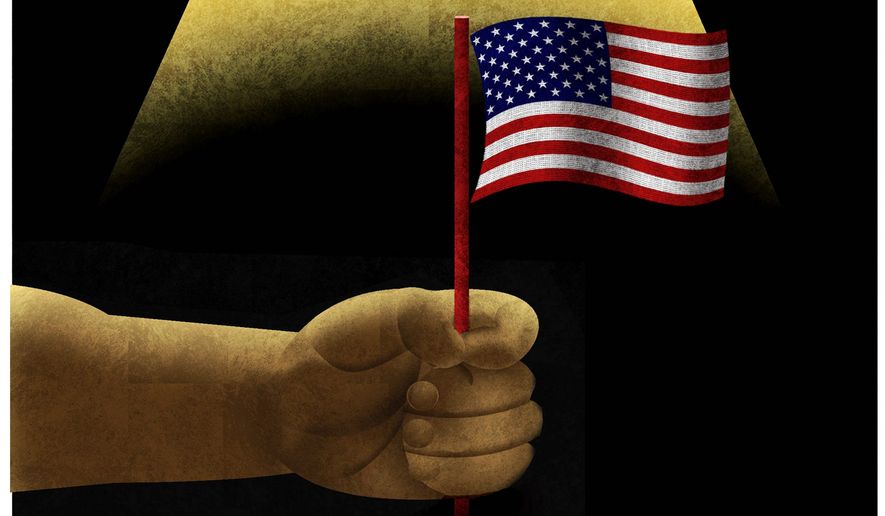OPINION:
Over the past year many people have been thinking about how to help Black Americans succeed. President Biden and his administration argue that more Black Americans are financially and socially behind because of systemic racism. He pledges to root out such systemic racism, without bothering to define what it is or what his administration will do to combat it.
We should be skeptical of discussions surrounding undefined systemic racism, particularly if the goal is to achieve racial equity. Leaving aside that treating everyone the same without regard to race is the right thing to do, when we focus on equality of opportunity rather than equality of outcome, everyone wins. And as we focus on increasing opportunity for everyone, the goal should be to focus on how individuals can achieve excellence, not just equity. All Americans, no matter their color, end up better off.
This is exactly what we did during the Trump administration. Embracing the maxim from President Reagan that the best social program is a job, the Trump administration focused on unleashing the animal spirits of the American economy through a pro-growth, low tax deregulatory agenda.
The Trump administration also established opportunity zones, which helped attract $75 billion in capital to underserved communities that had a substantially higher share of African Americans than the country at large. All of this got results. Before the pandemic hobbled our economy, the Black unemployment rate reached a record low, and, from 2016 to 2019, income growth for the bottom 10 percent of earners outpaced growth for the top 10 percent.
We can also help Black Americans, like we can help all Americans, by emphasizing the success sequence. According to the Brookings Institute, people who graduate high school, get a full-time job, and wait until turning 21 to get married and have kids have a 75% chance of joining the middle class, and only a two percent chance of ending up in poverty.
Even though these numbers may be slightly worse from Black Americans, there is no doubting that following the success sequence, no matter your race, will help individuals avoid poverty. The government can help Black Americans, like all Americans, by helping them follow the success sequence.
And the government can help Americans make it through the success sequence by improving the public education system and focusing more on making sure children succeed and less on indoctrinating students with faddish leftist causes and coddling the teacher’s unions that tend to dominate the systems.
I know first-hand how important education can be to your success in life. But too often our public-school systems choose the interests of teachers and the system itself over the interests of the students. When they do this, they fail the students. For example, in one district in 2017 only 11% of Black students were proficient or advanced in reading or math. But we know the districts can do better if they try.
As eminent scholar Thomas Sowell has noted, where a charter school, which is not subject to the whims of a teacher’s union, is located in the same building as a traditional public school, drawing students from the same community and usually admitted by lottery, the charter school students substantially outperform the public-school students. Government can help by refocusing our education system of achievement, rather than union featherbedding and indoctrination.
But that is just ways people can improve their material well-being. We should be concerned with their spiritual and moral health as well. Arthur Brooks, a social scientist at the Harvard Kennedy School and former president of the American Enterprise Institute, has observed that the key to happiness is having faith, family, friends and meaningful work.
A pro-growth, low tax deregulatory agenda will help provide meaningful work, and a focus on the success sequence will help foster successful families. But what about the others? I recently founded the American Cornerstone Institute, and one of the key things we look to promote is faith, because we realize that it can uplift, and provide the spiritual sustenance that the material world sometimes lack.
But faith and community, another focus of American Cornerstone, go hand in hand. Faith can bring people together. Faith can make people more compassionate. Faith communities are there when you need a helping hand, an ear to listen, or a shoulder to cry on. They provide so much that is necessary to a meaningful life. So, the lives of Black Americans, like the lives of all Americans, can be improved by making faith, and the communities that form around that faith, an integral component of their lives.
Frederick Douglass famously noted that “What I ask for the Negro is not benevolence, not pity, not sympathy, but simply justice.” He did not want special treatment for recently freed slaves, but just the dignity of being treated like everyone else, including being held to the same standards and expectations of their former masters.
The wisdom of those words then still holds true today: The best way to help Black Americans is to treat them as Americans who happen to be Black. By focusing on economic growth, the success sequence and faith, we can help make all Americans, including Black Americans, prosperous and happy.
• Dr. Ben Carson is founder and chairman of the American Cornerstone Institute.




Please read our comment policy before commenting.